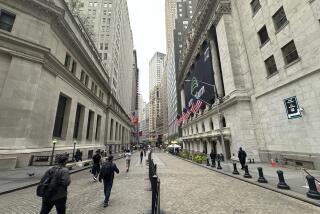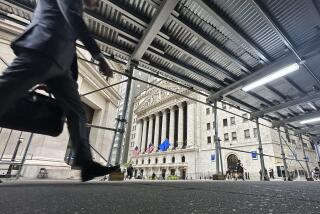Dow Plunges 156; Second Biggest Decline in History : Wall Street Falls Back Into Gloom
NEW YORK — The stock market suffered through another miserable Monday as the Dow Jones industrial average plunged 156.83 points today for its second-biggest loss and Wall Street fell back into the gloom of its collapse of a week ago.
The loss was even more stunning because it took place in a shorter time span than normal, as the exchange closed two hours early to deal with the bookkeeping nightmare created by the plunge last week.
“Last week we had Black Monday when stocks fell 508 points and this week we have Black and Blue Monday,” said Hugh Johnson, a stock market analyst with First Albany Co.
Despite the shorter hours, New York Stock Exchange volume was a massive 308.82 million shares, the sixth heaviest on record, contrasted to 245.56 million in Friday’s also shortened session. The market will close early again Tuesday.
Declining issues led advances 1,779 to 132 on the Big Board, where the average share price was $2.57 lower.
2nd-Worst Point Drop
With today’s new drop, the Dow Jones average slid to 1,793.93, below its level of 1,895.95 at the start of the year and only 55 points above last Monday’s close of 1,738.74.
The 8.04% loss today was much less than the the week-ago 22.6% drop. But the 156.83-point drop was the second-worst point drop in the record books after last Monday’s crash of 508.
The average lost nearly 300 points last week.
The value of all U.S. stocks fell $203 billion today, an evaporation of wealth exceeded only by the $503-billion drop a week earlier.
After stunning losses in Tokyo, Hong Kong and London, stocks toppled early in New York.
Threat of Recession
In addition, stocks were pushed lower by forecasts from a growing number of economists who say the stock market’s steep decline threatens to push an already sluggish U.S. economy into a recession.
The Dow fell 100 points in the first 40 minutes of trading even as President Reagan laid the groundwork with congressional leaders for negotiations on cutting the federal budget deficit in the hope that such action would restore some semblance of confidence in the financial system.
Traders noted a further deterioration in market psychology, with investors coming back from the weekend in a bearish mood and wanting to cut their losses. Moreover, the bargain hunting that spurred last week’s brief bounce back had lost its momentum.
“Cash is a precious commodity, and nobody wants to part with it at this point,” said Bill Schneider, a trader with Kidder, Peabody & Co..
“We are witnessing a panicky scramble for liquidity and the real scary part is that it is a worldwide phenomenon,” said First Albany’s Johnson.
Tokyo and Hong Kong
On the Tokyo Stock Exchange, the 225-share Nikkei stock average fell 4.7% today in its third-worst point decline. The Nikkei average closed down 1,096.22 points at 22,202.56.
Hong Kong’s Hang Seng index plunged 33%, a one-day record, in the first trading after a four-day suspension. The index fell 1,120.70 to 2,241.69.
Later in London, the Financial Times Index of 100 leading shares fell 111.1 points to 1,684.1, or 6.2%.
The Federal Reserve added liquidity to the banking system at 10:07 a.m. today, at least an hour and a half earlier than it usually conducts operations in the open market. Early interventions are done deliberately when the Fed wants to call the financial markets’ attention to the policy significance of its actions.
Last week the Fed pumped cash into the banking system every day.
More to Read
Inside the business of entertainment
The Wide Shot brings you news, analysis and insights on everything from streaming wars to production — and what it all means for the future.
You may occasionally receive promotional content from the Los Angeles Times.










